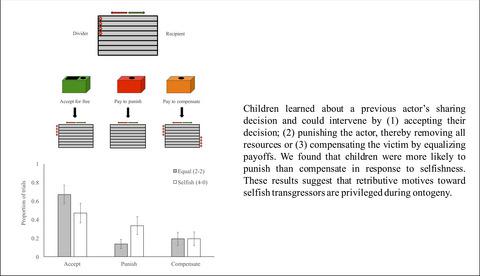Our official English website, www.x-mol.net, welcomes your feedback! (Note: you will need to create a separate account there.)
Children favor punishment over restoration
Developmental Science ( IF 4.939 ) Pub Date : 2021-02-02 , DOI: 10.1111/desc.13093 Katherine McAuliffe 1, 2 , Yarrow Dunham 2
Developmental Science ( IF 4.939 ) Pub Date : 2021-02-02 , DOI: 10.1111/desc.13093 Katherine McAuliffe 1, 2 , Yarrow Dunham 2
Affiliation

|
Why do people punish selfish behavior? Are they motivated to punish perpetrators of selfishness (retribution) or to compensate the victims of selfishness (restoration)? Developmental data can provide important insight into these questions by revealing whether punishment of selfishness is more retributive or restorative when it first emerges. Across two studies, we examined costly third-party intervention in 6- to 9-year-olds. In Study 1, children learned about a selfish actor who refused to share with a recipient. Children then chose to (1) punish the selfish actor by rejecting their payoff (retribution); (2) compensate the victim of selfishness by equalizing payoffs between the perpetrator and victim (restoration); or (3) do nothing. We found that children were more likely to punish than compensate in response to selfishness, suggesting that intervention in this context is more retributive than restorative. In Study 2, we tested third-party intervention in the face of generosity which, like selfishness, can lead to unequal outcomes. As in Study 1, children in this context could reject unequal payoffs, thereby depriving the recipient of the advantageous payoff but having no effect on the actor. Children could also use compensation in this context, equalizing the payoffs between actor and recipient. We found that children did not punish inequality that stemmed from generosity, suggesting that the retributive punishment in Study 1 was specifically targeting selfishness rather than inequality more generally. These results contribute to the debate on the function of third-party punishment in humans, suggesting that retributive motives toward selfish transgressors are privileged during ontogeny.
中文翻译:

儿童更喜欢惩罚而不是恢复
为什么人们会惩罚自私的行为?他们的动机是惩罚自私的肇事者(报应)还是补偿自私的受害者(恢复)?发展数据可以揭示对自私的惩罚在首次出现时是更具报复性还是更具恢复性,从而为这些问题提供重要的洞察力。在两项研究中,我们检查了对 6 至 9 岁儿童的昂贵的第三方干预。在研究 1 中,孩子们了解到一个自私的演员拒绝与接受者分享。然后孩子们选择(1)通过拒绝他们的回报(报应)来惩罚自私的演员;(2) 通过均衡施害者和受害者之间的回报来补偿自私的受害者(恢复); 或 (3) 什么都不做。我们发现,孩子们对自私的反应更可能是惩罚而不是补偿,这表明在这种情况下的干预更具报复性而不是恢复性。在研究 2 中,我们测试了第三方干预面对慷慨的情况,这与自私一样会导致不平等的结果。与研究 1 一样,在这种情况下,儿童可以拒绝不平等的回报,从而剥夺接受者的有利回报,但对行动者没有影响。在这种情况下,孩子们也可以使用补偿,平衡演员和接受者之间的回报。我们发现儿童不会惩罚源于慷慨的不平等,这表明研究 1 中的报复性惩罚专门针对自私而不是更普遍的不平等。
更新日期:2021-02-02
中文翻译:

儿童更喜欢惩罚而不是恢复
为什么人们会惩罚自私的行为?他们的动机是惩罚自私的肇事者(报应)还是补偿自私的受害者(恢复)?发展数据可以揭示对自私的惩罚在首次出现时是更具报复性还是更具恢复性,从而为这些问题提供重要的洞察力。在两项研究中,我们检查了对 6 至 9 岁儿童的昂贵的第三方干预。在研究 1 中,孩子们了解到一个自私的演员拒绝与接受者分享。然后孩子们选择(1)通过拒绝他们的回报(报应)来惩罚自私的演员;(2) 通过均衡施害者和受害者之间的回报来补偿自私的受害者(恢复); 或 (3) 什么都不做。我们发现,孩子们对自私的反应更可能是惩罚而不是补偿,这表明在这种情况下的干预更具报复性而不是恢复性。在研究 2 中,我们测试了第三方干预面对慷慨的情况,这与自私一样会导致不平等的结果。与研究 1 一样,在这种情况下,儿童可以拒绝不平等的回报,从而剥夺接受者的有利回报,但对行动者没有影响。在这种情况下,孩子们也可以使用补偿,平衡演员和接受者之间的回报。我们发现儿童不会惩罚源于慷慨的不平等,这表明研究 1 中的报复性惩罚专门针对自私而不是更普遍的不平等。



























 京公网安备 11010802027423号
京公网安备 11010802027423号